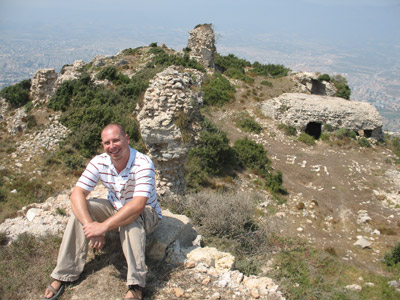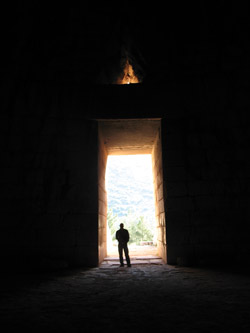
in Turkey, sees physical anthropology as “knowing the human body, the
skeleton and the bodily processes that affect people in life. You also have
to understand how culture shapes human biology. Since we became
farmers over 10,000 years ago, we have been changing the natural world
around us, including our own species.”
Even as a kid, Nathan Harper '99/03 wanted to be an anthropologist.
“I had a serious interest in history,” Harper says, “particularly Classical Greece and the Middle Ages, especially the Crusades. I had a fascination with dinosaurs and the natural world. Archaeology was always part of these interests. What better way to combine all of my interests than anthropology, the holistic study of human groups and their culture?”
Graduating from Wichita State in 1999 with a bachelor’s degree and again
in 2003 with a master’s degree, both in anthropology, Harper still has a passion for anthropology and says that being
a Shocker prepared him well for his work today.
“WSU was a great learning environment, with faculty who truly care about your development as a scholar,” he says.
While at WSU, Harper received a Fulbright Fellowship to study in Cyprus during the 2001-02 academic year. Established in 1946 by Arkansas Sen. J. William Fulbright to foster educational and cultural exchange, the Fulbright program is overseen by the International Institute of Education. About 9,000 fellowships are awarded each year.

of the Treasury of Atreus,
a massive tholos tomb at
Mycenae.
Harper spent nine months on the island of Cyprus doing research at a settlement called Khirokitia, which, he says, is about 8,000 to 9,000 years old.
This site is known as one of the best-preserved prehistoric sites of the eastern Mediterranean area and is a designated UNESCO World Cultural Heritage site.
Since then, he has become a PhD candidate at the University of Nevada, Las Vegas and was awarded a fellowship to the American School of Classical Studies in Athens, Greece, for 2007-08. He has passed his doctoral exams and is now writing his dissertation in Athens.
The focus of his dissertation is how people on Cyprus interacted with one another
and with groups outside of the island during the Bronze Age (1600-1100 BC).
Harper explains that this period in the eastern Mediterranean is a time of “great interconnection and upheaval. In the centuries leading up to the Trojan War, there
were increasing contacts between the peoples from Greece, Crete, the Levant
and Cyprus.”

Mycenae, Greece.
He adds that Cyprus, rich in Bronze-Age goods, notably copper, was a hub of activity. It was, he says, “used as a way station and trading point between the east and the west.”
In his research, Harper employs quantitative population genetics, which, he explains, are statistics based on genetic models that use measurements of teeth or bones as stand-ins
for DNA.
“I’m measuring teeth of males and females from four sites in Cyprus,” he says, “and comparing them to three sites in Greece and two sites in the Levant.” He reports that
his preliminary findings point to two distinct kinship/marriage networks in Cyprus.
Peer Moore-Jansen, professor and chair of WSU’s anthropology department, fueled Harper’s interest in anthropology when he came to Wichita State. “Peer Moore-Jansen was the single greatest influence on my WSU career,” says Harper.
Moore-Jansen believes that Harper was one his brightest and best students. “It’s a joy,” he says, “to see someone like him go out and succeed.”





